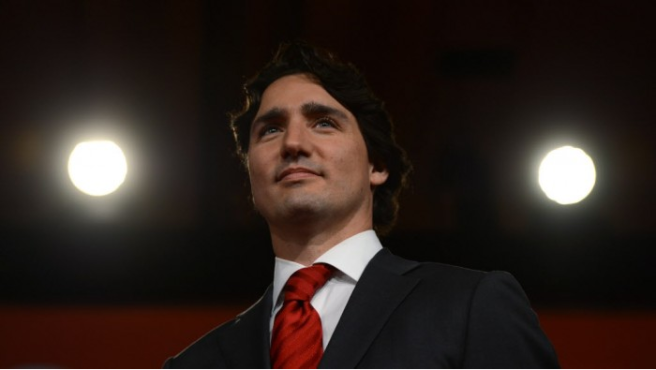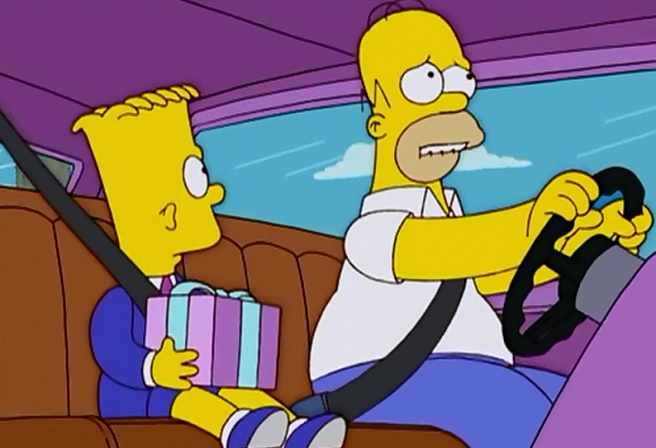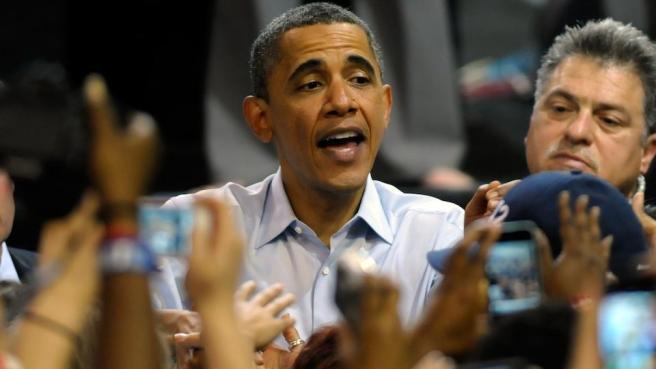When I wrote this last summer it was just talk. Rumour, speculation, wishful thinking perhaps on the part of defeated Liberals nostalgic for the glories of bygone days. I wrote it with a sense of hope and optimism and something of a knowing smile after watching both seasoned, professional political pundits and anonymous Internet hacks (or is it seasoned anonymous pundits and professional political hacks) fall all over themselves concern trolling Liberals over their potential leader-in-waiting, who hadn’t even declared his intentions at that point. It seems so long ago. But last night it became reality. Justin Trudeau is the new leader of the Liberal Party of Canada.
Not that the concern trolling is going to stop. In fact, it’s been going on through the entire Liberal leadership race. Charges that Trudeau is nothing more than a silver spoon-fed famous last name with good hair and no policy experience. We’ll just see it ratcheted up a thousand degrees now that things are official. The jumped-up frat boys of the Conservative war room have been squirming giddily for months now with dozens of attack ads ready to saturate the airwaves with the same message: He’s too young, he’s not ready, and Canada desperately needs the seasoned economic stewardship of Messrs. Harper and Flaherty – those same guys who boast to any available microphone that Canada’s economy is doing better than anywhere else in the world but is also, paradoxically, apparently so fragile that it will collapse in a heartbeat if they’re not allowed to keep running Economic Action Plan commercials (which, as you file your taxes this month, you should remember that you’re paying for) every two minutes.
Liberals worry about the coming onslaught. (The first ad has already been released, but I’m not dignifying it by providing a link.) But they won’t be as effective against Trudeau as they were about his predecessors. Stéphane Dion and Michael Ignatieff were unknown quantities – the former a lesser known junior cabinet minister, the latter almost completely unknown outside academia – and vulnerable to being defined before they could define themselves. Most Canadians’ opinions about Justin Trudeau have been more or less cemented at this point. If you already like him, you’re not going to be swayed by what the nasty Conservatives say, and if you’re still holding on to an NEP grudge, you were never going to vote for him anyway (and fortunately for Liberals, that’s a diminishing constituency). A few veteran Liberals were surprised when Trudeau announced a few weeks ago that he would not go negative, and they rued a repeat of Dion-Ignatieff where taking the high road meant progressively less seats in the House. But as usual, they were oversimplifying what Trudeau meant – anyone who saw the Brazeau fight knows that he’ll never refrain from punching back. Saying that he won’t go negative is about the vision he intends to offer the country.
Ever since their election in 2006, the Conservative Party of Canada has governed as though they were still on the opposition benches. Forgetting that being in power means more than just fancy titles and bigger offices, and that you actually have to, you know, do some stuff, they have never shaken the mode of perpetual critic – devoting the majority of their efforts to scaring Canadians about the members on the opposition benches and blaming them for not being able to get anything done. The truth is that Conservatives don’t actually want to do anything. They are a party utterly bereft of a vision, unless that vision is enriching an already wealthy few. The Prime Minister, a passionless zombie, has never seemed as though he even likes his native land very much, quick as he is in attacking the patriotism of his critics. His record proves it. Even George W. Bush played at being a “uniter, not a divider;” Harper said famously that whether Canada devolves into a loose association of provinces and territories is secondary in his opinion. It’s all about tearing down what has been built because… I don’t really know. It’s there, I guess? He’s never said otherwise. When Harper does talk about where he sees Canada in the future, his answers centre entirely on economic progress, i.e., money. Get rich or die tryin’. For him, empathy doesn’t compute. That’s why Harper can’t fathom that there could be something more, something greater, running through the experience of what it means to be Canadian other than hockey and Tim Horton’s and a 200-year-old war no one cares about. Stephen Harper is the model of a man who has lived his entire life feeling like he has never belonged to anything, and thus spends his time finding ever more inventive ways to promulgate the same loneliness and misery in everyone else. He is the perpetual kid looking up at the treehouse where the meeting of the “No Stephens” club is being convened. I suspect I’m not alone in believing that his national therapy session at the taxpayer’s expense has gone on long enough, and that it’s time for him to retire to a bunch of corporate boards and hundred-thousand-dollar lecture circuits while the work of rebuilding Canada begins.
In the wake of nearly a decade of Canadians being pitted against one another in the name of electoral math, Justin Trudeau has an opportunity. He recognizes that it is not enough for him, nor the Liberal Party, to expect to coast to victory because people don’t like Stephen Harper. It was why I could never get behind Joyce Murray’s push for an anti-Harper electoral pact with the NDP – voters would be more likely to lean Conservative or not vote because they would feel their right of choice was being taken away. Additionally, Mitt Romney proved somewhat definitively that you can’t win an election by simply not being the incumbent; he also showed that a campaign bereft of positive ideas for people to latch onto, a campaign devoted entirely to the failings of the other guy, is doomed. And we need to tune out the pundits and amateur critics howling that Trudeau has no policies, no plans. Let’s state firmly and understand that plans do not win elections. The idea that they do is a fallacy perpetuated by political writers trying to prove they’re smarter than everyone else. I hate to keep repeating this same quote of Simon Sinek’s, but it applies as equally to politics as it does to creativity, or entrepreneurship. “People don’t buy what you do, they buy why you do it.” The why – the vision – is what will carry Justin Trudeau forward, through attack ads, through op-ed hit jobs, through every gaffe and misstatement gleefully dissected in five-part exposés on right-wing media and in their echo chamber of angry bloggers. Being able to say that Canada is a great country and a light in the world, and here’s why. Join with me to make it even greater.
Barack Obama’s first campaign for the presidency was about Hope and Change – notice that hope came first. Hope resonates through fear and anger, no matter how loud or well-funded the voices of the latter. Even at their worst, human beings have an incredible capacity for optimism and are amazingly receptive to positivity. Justin Trudeau senses that this primal need is going unfulfilled by the cynical jackalopes on the government benches who never miss a chance to spread fear and xenophobia instead. His chosen course is to give Canadians a vision of a government and indeed a country that is far more than tax cuts and deregulation and policies drawn from the Book of Leviticus. There will be the hard and tedious work of rebuilding riding associations, boosting fundraising, recruiting candidates and getting the Liberal Party into fighting shape for 2015 (or whenever Harper decides to break his fixed-election date law again). But none of that matters if the message is not there. Merely having a famous surname, as his critics allege, doesn’t generate the kind of enthusiasm that Trudeau has been seeing at his rallies. What he is saying – his why – is connecting with people and inspiring them. When you reach that point of critical mass and explode into a movement, as Obama did, suddenly everyone wants to rush to jump onboard. It’s important to stress also that this sort of phenomenon is not about a particular candidate’s individual level of celebrity or indeed even who he is as a person – he instead becomes the lightning rod by which a collective excitement is channeled into sweeping, grassroots change.
Justin Trudeau stands on the cusp of achieving that.
Stephen Harper has dreamt of, but never touched that kind of appeal. At his best, he has always been a “least of the worst” option. Against a genuine movement, he has no chance. Against the younger generation finally motivated to come out and vote en masse to shape their future, he has no chance. Against the offer of a Canada that demands the best of our nature and rewards us accordingly, he has no chance. He can go finish his hockey book and look back longingly at Parliament Hill and the “No Stephens” sign in the window of 24 Sussex.
As Justin Trudeau begins his first day as Leader of the Liberal Party, let’s not get lost in the background noise, in the minutiae of policies and platforms, and the dissection of the inflection of each word by his opponents looking for find chinks in the armor. Let’s instead answer the call to participate in building a Canada that stays true both at home and abroad to the principles we value most. Let us reward those who advance a positive vision of our true North, strong and free, and let us send the cynics home to whine about it on the Internet. That’s the Canada I’d like to see, and the one that I believe Justin Trudeau has a chance to make happen. With our help. A black man did not win election to the Presidency twice just because he was a great speaker. And Justin Trudeau will not be elected Prime Minister on the reputation of his father. In the end, the why will secure the win, just as it would if his name was Justin Terkowicz.
And so, as a famous fictional president would often opine, what’s next?










